Burt A. The Evolution of the British Empire and Commonwealth From the American Revolution
Подождите немного. Документ загружается.

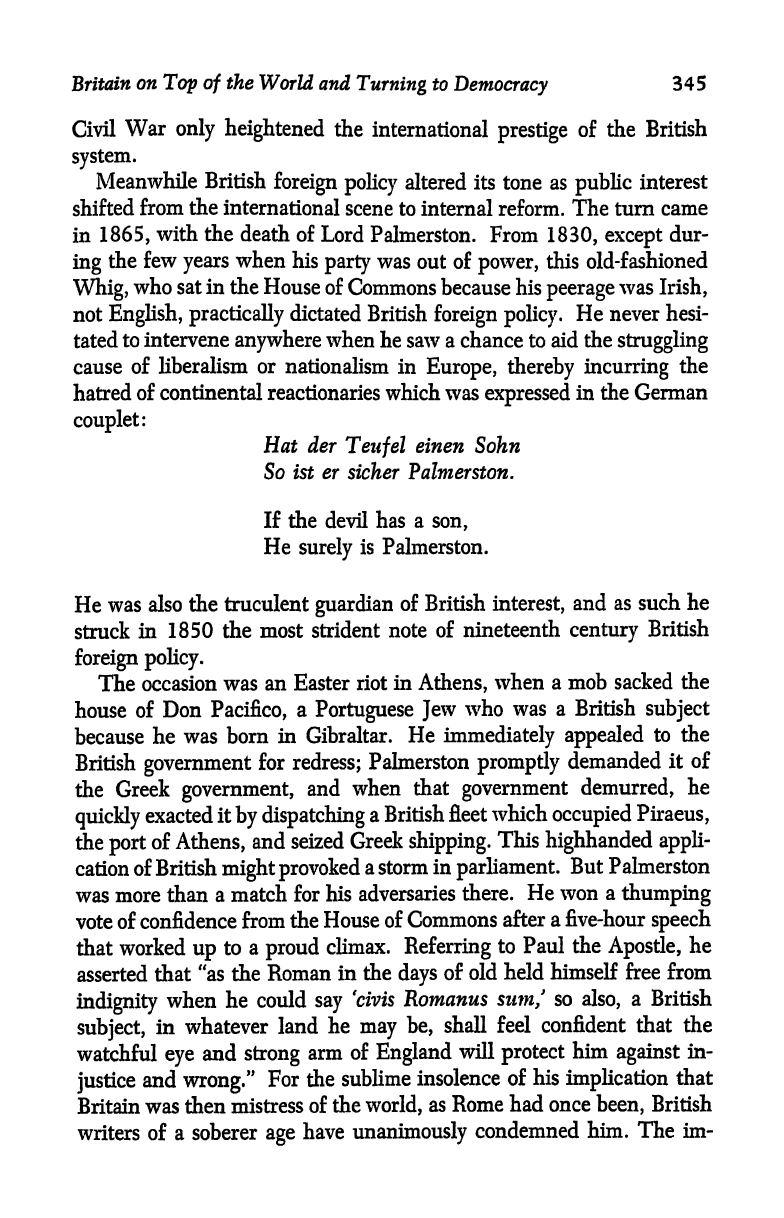
Britain
on
Top
of
the
World
and
Turning
to
Democracy
345
Civil
War
only
heightened
the
international
prestige
of
the British
system.
Meanwhile
British
foreign
policy
altered
its tone
as
public
interest
shifted
from
the
international scene
to internal reform.
The turn
came
in
1865,
with
the death
of
Lord
Palmerston. From
1830,
except
dur-
ing
the
few
years
when
his
party
was
out of
power,
this old-fashioned
Whig,
who sat
in
the
House of
Commons because his
peerage
was
Irish,
not
English,
practically
dictated
British
foreign
policy.
He never
hesi-
tated
to
intervene
anywhere
when he
saw
a chance to aid
the
struggling
cause
of liberalism
or
nationalism in
Europe, thereby incurring
the
hatred
of continental
reactionaries which was
expressed
in the German
couplet:
Hat der
Teufel
einen
Sohn
So
ist er
sicker 'Palmerston.
If the
devil
has
a
son,
He
surely
is Palmerston.
He
was
also
the
truculent
guardian
of
British
interest,
and
as such he
struck
in
1850
the
most strident
note
of
nineteenth
century
British
foreign
policy.
The
occasion
was an
Easter
riot
in
Athens,
when a mob sacked
the
house
of
Don
Pacifico,
a
Portuguese
Jew
who
was a British
subject
because
he was born
in
Gibraltar.
He
immediately appealed
to the
British
government
for
redress;
Palmerston
promptly
demanded
it of
the Greek
government,
and
when
that
government
demurred,
he
quickly
exacted
it
by
dispatching
a
British
fleet
which
occupied
Piraeus,
die
port
of
Athens,
and
seized Greek
shipping.
This
highhanded
appli-
cation of
British
might
provoked
a storm
in
parliament.
But Palmerston
was
more
than a
match
for
his adversaries
there.
He
won
a
thumping
vote
of confidence
from
the
House of
Commons
after a five-hour
speech
that
worked
up
to
a
proud
climax.
Referring
to
Paul the
Apostle,
he
asserted
that
"as the
Roman
in
the
days
of
old
held
himself free from
indignity
when he
could
say
'civis
Romanus
sum/
so
also,
a British
subject,
in
whatever land
he
may
be,
shall
feel confident that
the
watchful
eye
and
strong
arm
of
England
will
protect
him
against
in-
justice
and
wrong."
For
the
sublime
insolence
of
his
implication
that
Britain
was then
mistress
of
the
world,
as
Rome had once
been,
British
writers of
a soberer
age
have
unanimously
condemned
him. The im-
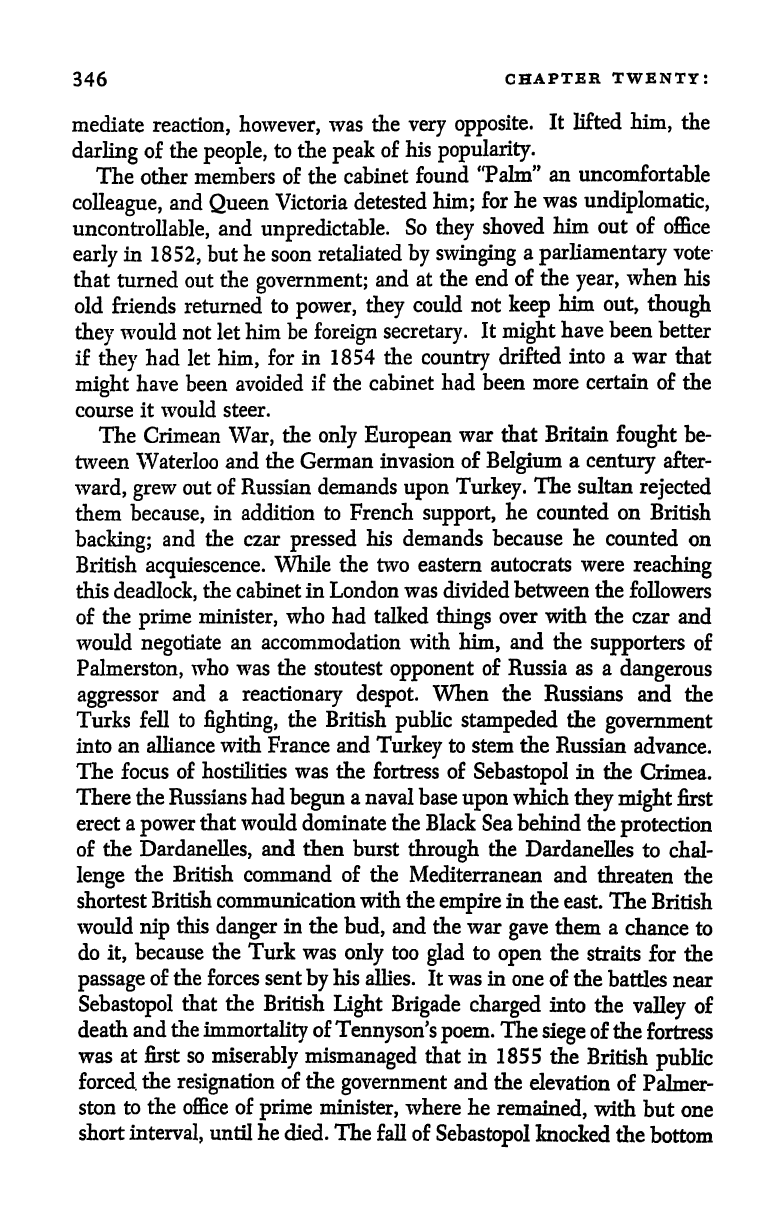
346
CHAPTER
TWENTY:
mediate
reaction,
however,
was
the
very
opposite.
It lifted
him,
the
darling
of
the
people,
to
the
peak
of
his
popularity.
The
other
members
of
the
cabinet
found
"Palm"
an
uncomfortable
colleague,
and
Queen
Victoria
detested
him;
for
he
was
undiplomatic,
uncontrollable,
and
unpredictable.
So
they
shoved
him
out of
office
early
in
1852,
but
he
soon
retaliated
by swinging
a
parliamentary
vote
that
turned out
the
government;
and
at the end
of
the
year,
when
his
old
friends
returned
to
power,
they
could
not
keep
him
out,
though
they
would
not
let
him
be
foreign
secretary.
It
might
have been
better
if
they
had
let
him,
for
in 1854
the
country
drifted
into
a
war
that
might
have been avoided
if the
cabinet
had
been
more
certain
of
the
course it would
steer.
The
Crimean
War,
the
only
European
war
that
Britain
fought
be-
tween Waterloo
and the German
invasion of
Belgium
a
century
after-
ward,
grew
out
of
Russian
demands
upon
Turkey.
The
sultan
rejected
them
because,
in
addition
to French
support,
he counted on
British
backing;
and
the
czar
pressed
his
demands because
he
counted
on
British
acquiescence.
While the
two
eastern
autocrats
were
reaching
this
deadlock,
the
cabinet
in London was divided
between the
followers
of
the
prime
minister,
who had talked
things
over
with the
czar
and
would
negotiate
an
accommodation
with
him,
and the
supporters
of
Palmerston,
who was
the
stoutest
opponent
of
Russia
as a
dangerous
aggressor
and a
reactionary
despot.
When the
Russians
and the
Turks fell
to
fighting,
the British
public
stampeded
the
government
into
an
alliance
with France
and
Turkey
to
stem
the
Russian
advance.
The
focus
of hostilities was
the fortress of
Sebastopol
in
the
Crimea.
There
the
Russians
had
begun
a
naval base
upon
which
they
might
first
erect
a
power
that
would dominate the
Black
Sea behind
the
protection
of
the
Dardanelles,
and
then
burst
through
the
Dardanelles
to chal-
lenge
the British
command
of
the
Mediterranean
and
threaten the
shortest
British
communication with
the
empire
in
the
east.
The
British
would
nip
this
danger
in
the
bud,
and the
war
gave
them
a
chance
to
do
it,
because
the
Turk was
only
too
glad
to
open
the
straits
for
the
passage
of the forces sent
by
his
allies.
It was in
one
of the
battles
near
Sebastopol
that the British
Light Brigade
charged
into
the
valley
of
death
and the
immortality
of
Tennyson's
poem.
The
siege
of the
fortress
was at
first so
miserably
mismanaged
that in
1855
the
British
public
forced,
the
resignation
of the
government
and the
elevation
of
Palmer-
ston
to
the
office of
prime
minister,
where
he
remained,
with
but
one
short
interval,
until he died. The
fall of
Sebastopol
knocked
the
bottom
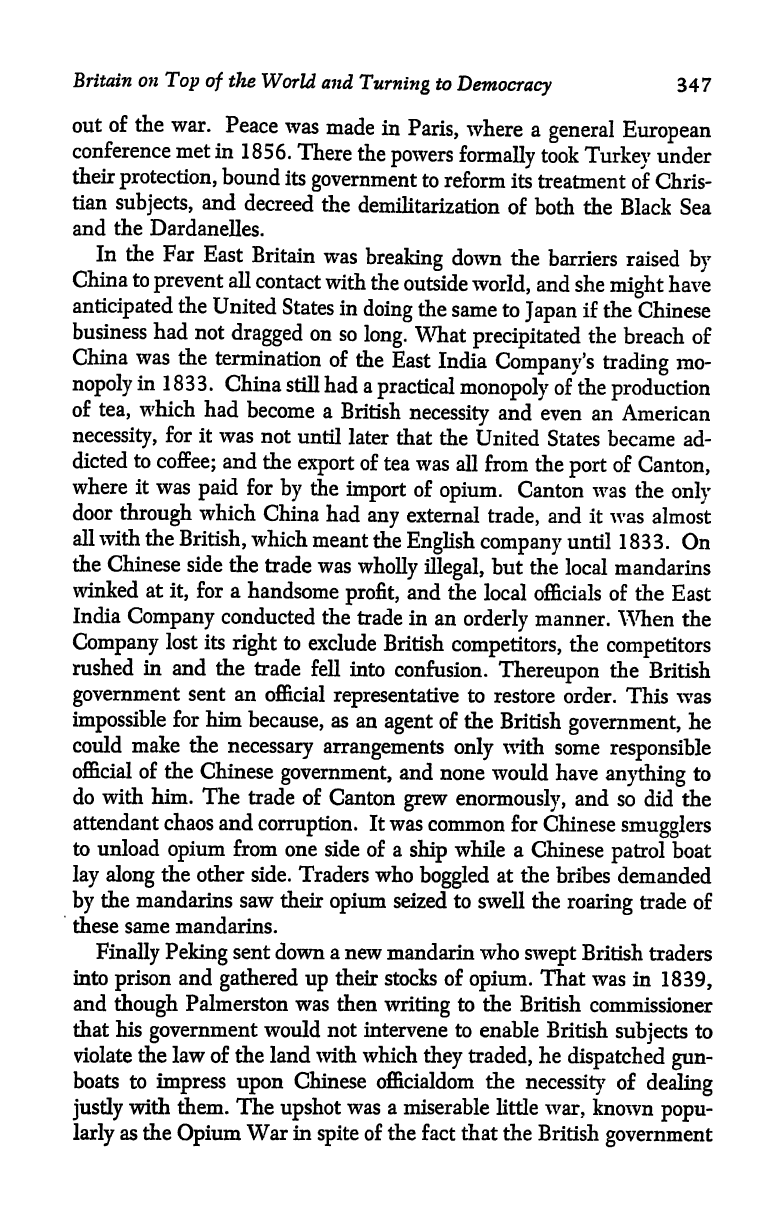
Britain
on
Top
of
the
World
and
Turning
to
Democracy
347
out
of
the
war.
Peace
was
made
in
Paris,
where
a
general
European
conference
met
in
1856.
There
the
powers
formally
took
Turkey
under
their
protection,
bound
its
government
to
reform
its
treatment
of Chris-
tian
subjects,
and
decreed
the
demilitarization
of
both the
Black Sea
and
the
Dardanelles.
In the Far
East
Britain
was
breaking
down
the
barriers
raised
by
China
to
prevent
all
contact
with
the
outside
world,
and she
might
have
anticipated
the
United
States
in
doing
the
same
to
Japan
if the
Chinese
business had
not
dragged
on
so
long.
What
precipitated
the
breach of
China
was
the
termination
of
the
East
India
Company's
trading
mo-
nopoly
in 1
833.
China
still
had
a
practical
monopoly
of the
production
of
tea,
which
had
become
a
British
necessity
and even an
American
necessity,
for it
was
not
until
later
that
the
United
States
became ad-
dicted
to
coffee;
and
the
export
of
tea
was
all
from the
port
of
Canton,
where it
was
paid
for
by
the
import
of
opium.
Canton
was the
only
door
through
which
China
had
any
external
trade,
and it was
almost
all
with
the
British,
which
meant
the
English
company
until
1833.
On
the Chinese
side
the
trade
was
wholly
illegal,
but the
local
mandarins
winked at
it,
for a
handsome
profit,
and the
local
officials of the
East
India
Company
conducted
the
trade
in
an
orderly
manner.
When
the
Company
lost its
right
to
exclude
British
competitors,
the
competitors
rushed in
and
the
trade
fell
into
confusion.
Thereupon
the British
government
sent
an
official
representative
to
restore order.
This was
impossible
for him
because,
as
an
agent
of
the British
government,
he
could make the
necessary
arrangements
only
with
some
responsible
official of the
Chinese
government,
and
none
would have
anything
to
do
with him.
The
trade of
Canton
grew
enormously,
and
so
did the
attendant
chaos and
corruption.
It was
common for
Chinese
smugglers
to unload
opium
from one
side
of
a
ship
while a
Chinese
patrol
boat
lay
along
the
other side.
Traders who
boggled
at the
bribes
demanded
by
the mandarins saw their
opium
seized
to swell the
roaring
trade of
these
same
mandarins.
Finally
Peking
sent
down
a
new
mandarin
who
swept
British
traders
into
prison
and
gathered up
their
stocks of
opium.
That
was
in
1839,
and
though
Palmerston
was then
writing
to
the
British
commissioner
that his
government
would
not
intervene to
enable
British
subjects
to
violate
the law
of
the
land with
which
they
traded,
he
dispatched
gun-
boats
to
impress
upon
Chinese officialdom the
necessity
of
dealing
justly
with
them.
The
upshot
was
a
miserable little
war,
known
popu-
larly
as
the
Opium
War in
spite
of
the
fact
that
the
British
government
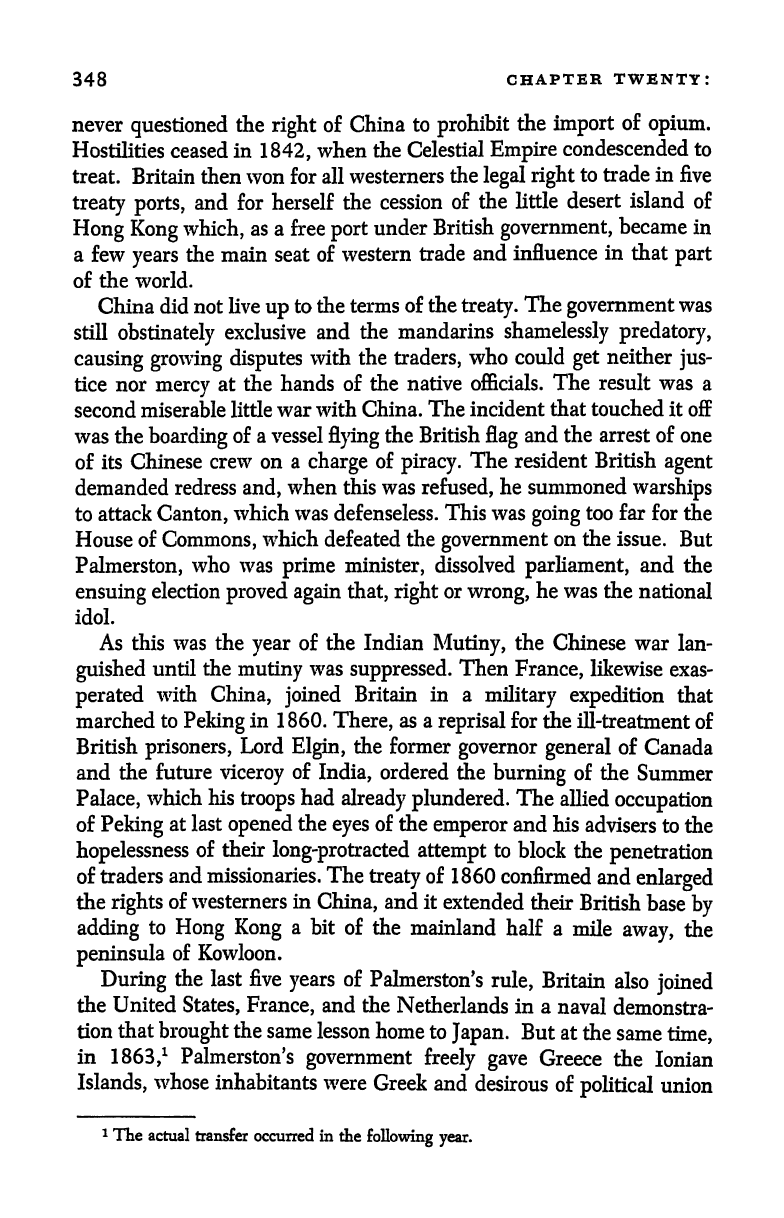
348
CHAPTER
TWENTY:
never
questioned
the
right
of China
to
prohibit
the
import
of
opium.
Hostilities
ceased in
1842,
when
the
Celestial
Empire
condescended
to
treat. Britain then
won
for all westerners
the
legal
right
to trade
in
five
treaty ports,
and for
herself the
cession
of
the
little
desert island
of
Hong
Kong
which,
as
a
free
port
under
British
government,
became
in
a few
years
the main seat
of
western
trade and
influence
in
that
part
of
the
world.
China did
not
live
up
to
the
terms of
the
treaty.
The
government
was
still
obstinately
exclusive
and
the mandarins
shamelessly
predatory,
causing
growing disputes
with the
traders,
who
could
get
neither
jus-
tice nor
mercy
at the
hands of the
native
officials.
The result was
a
second miserable little
war with China.
The incident
that
touched it off
was
the
boarding
of
a
vessel
flying
the
British
flag
and the arrest of
one
of
its
Chinese
crew on
a
charge
of
piracy.
The
resident
British
agent
demanded
redress
and,
when this was
refused,
he summoned
warships
to
attack
Canton,
which
was
defenseless.
This
was
going
too
far
for
the
House
of
Commons,
which defeated
the
government
on the issue.
But
Palmerston,
who was
prime
minister,
dissolved
parliament,
and
the
ensuing
election
proved again
that,
right
or
wrong,
he
was
the
national
idol.
As this
was the
year
of
the Indian
Mutiny,
the
Chinese war
lan-
guished
until
the
mutiny
was
suppressed.
Then
France,
likewise
exas-
perated
with
China,
joined
Britain in a
military
expedition
that
marched
to
Peking
in
1 860.
There,
as
a
reprisal
for
the
ill-treatment of
British
prisoners,
Lord
Elgin,
the former
governor
general
of
Canada
and
the
future
viceroy
of
India,
ordered die
burning
of the
Summer
Palace,
which
his
troops
had
already plundered.
The
allied
occupation
of
Peking
at last
opened
the
eyes
of the
emperor
and his
advisers to the
hopelessness
of
their
long-protracted
attempt
to
block
the
penetration
of
traders
and
missionaries.
The
treaty
of 1860
confirmed
and
enlarged
the
rights
of
westerners
in
China,
and
it
extended
their
British
base
by
adding
to
Hong Kong
a
bit of
the
mainland
half a
mile
away,
the
peninsula
of Kowloon.
During
the last five
years
of
Palmerston's
rule,
Britain
also
joined
the
United
States,
France,
and the
Netherlands
in
a
naval
demonstra-
tion
that
brought
the
same
lesson home
to
Japan.
But
at
the
same
time,
in
1863,
1
Palmerston's
government
freely
gave
Greece
the
Ionian
Islands,
whose
inhabitants
were
Greek
and
desirous
of
political
union
1
The
actual
transfer
occurred in
the
following
year.
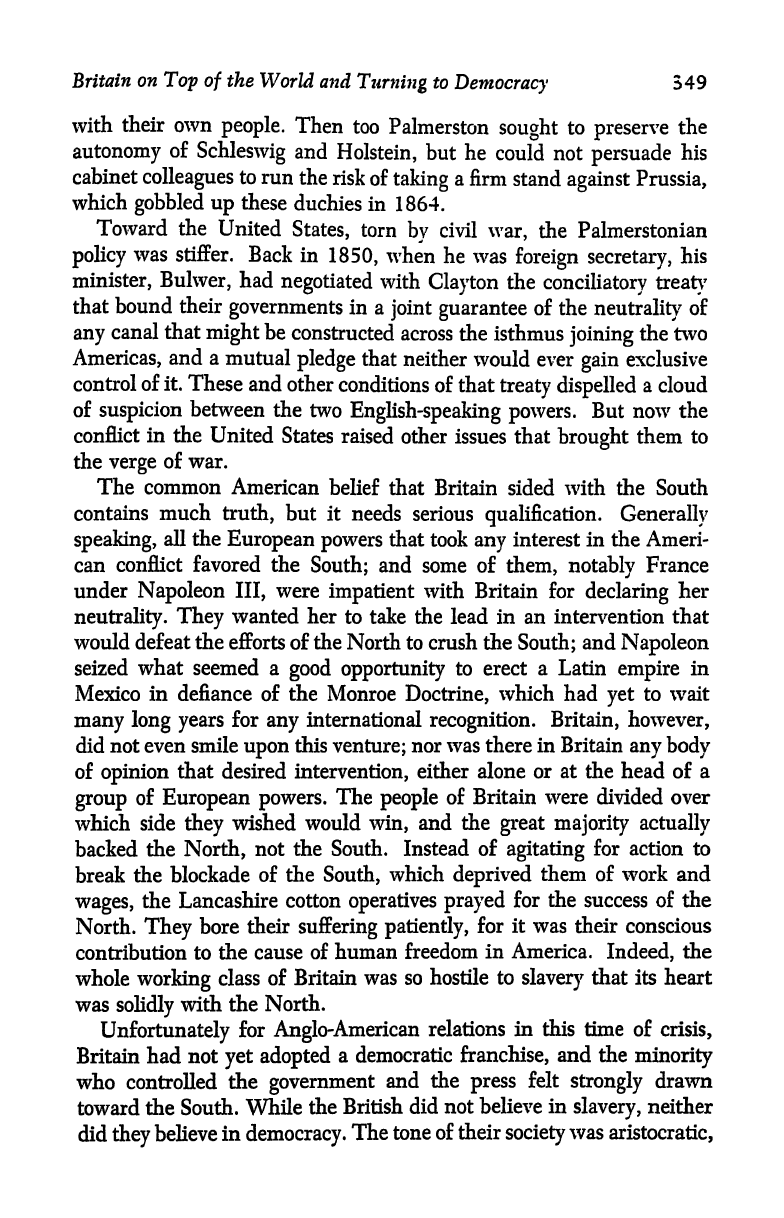
Britain
on
Top
of
the
World
and
Turning
to
Democracy
349
with
their
own
people.
Then
too
Palmerston
sought
to
preserve
the
autonomy
of
Schleswig
and
Holstein,
but he
could not
persuade
his
cabinet
colleagues
to
run
the
risk
of
taking
a
firm
stand
against
Prussia,
which
gobbled up
these
duchies in
1864.
Toward
the
United
States,
torn
by
civil
war,
the
Palmerstonian
policy
was
stiffer.
Back in
1850,
when
he
was
foreign
secretary,
his
minister,
Bulwer,
had
negotiated
with
Clayton
the
conciliatory
treat}
7
that
bound
their
governments
in a
joint
guarantee
of the
neutrality
of
any
canal
that
might
be
constructed
across
the
isthmus
joining
the two
Americas,
and a
mutual
pledge
that
neither
would ever
gain
exclusive
control
of
it.
These
and
other
conditions
of
that
treaty
dispelled
a
cloud
of
suspicion
between the
two
English-speaking
powers.
But
now
the
conflict
in
the
United
States
raised other
issues
that
brought
them to
the
verge
of war.
The common
American
belief that
Britain
sided
with
the
South
contains
much
truth,
but it
needs serious
qualification.
Generally
speaking,
all
the
European
powers
that
took
any
interest
in
the
Ameri-
can
conflict favored the
South;
and some of
them,
notably
France
under
Napoleon
III,
were
impatient
with Britain for
declaring
her
neutrality.
They
wanted her
to take the lead in an intervention that
would defeat the
efforts of
the
North to crush the
South;
and
Napoleon
seized
what
seemed a
good
opportunity
to
erect
a Latin
empire
in
Mexico in
defiance of
the
Monroe
Doctrine,
which had
yet
to wait
many long
years
for
any
international
recognition.
Britain,
however,
did not
even smile
upon
this
venture;
nor was there in
Britain
any body
of
opinion
that
desired
intervention,
either alone or
at
the head of
a
group
of
European powers.
The
people
of
Britain were
divided over
which
side
they
wished
would
win,
and
the
great
majority actually
backed
the
North,
not the South. Instead of
agitating
for
action to
break
the blockade
of
the
South,
which
deprived
them of
work and
wages,
the Lancashire
cotton
operatives
prayed
for
the
success of the
North.
They
bore
their
suffering
patiently,
for
it
was their conscious
contribution
to the cause
of human
freedom
in
America.
Indeed,
the
whole
working
class
of
Britain was
so hostile
to
slavery
that its heart
was
solidly
with the North.
Unfortunately
for
Anglo-American
relations
in this time
of
crisis,
Britain had not
yet
adopted
a democratic
franchise,
and the
minority
who
controlled
the
government
and
the
press
felt
strongly
drawn
toward
the South.
While
the
British did
not believe
in
slavery,
neither
did
they
believe
in
democracy.
The
tone
of their
society
was
aristocratic,
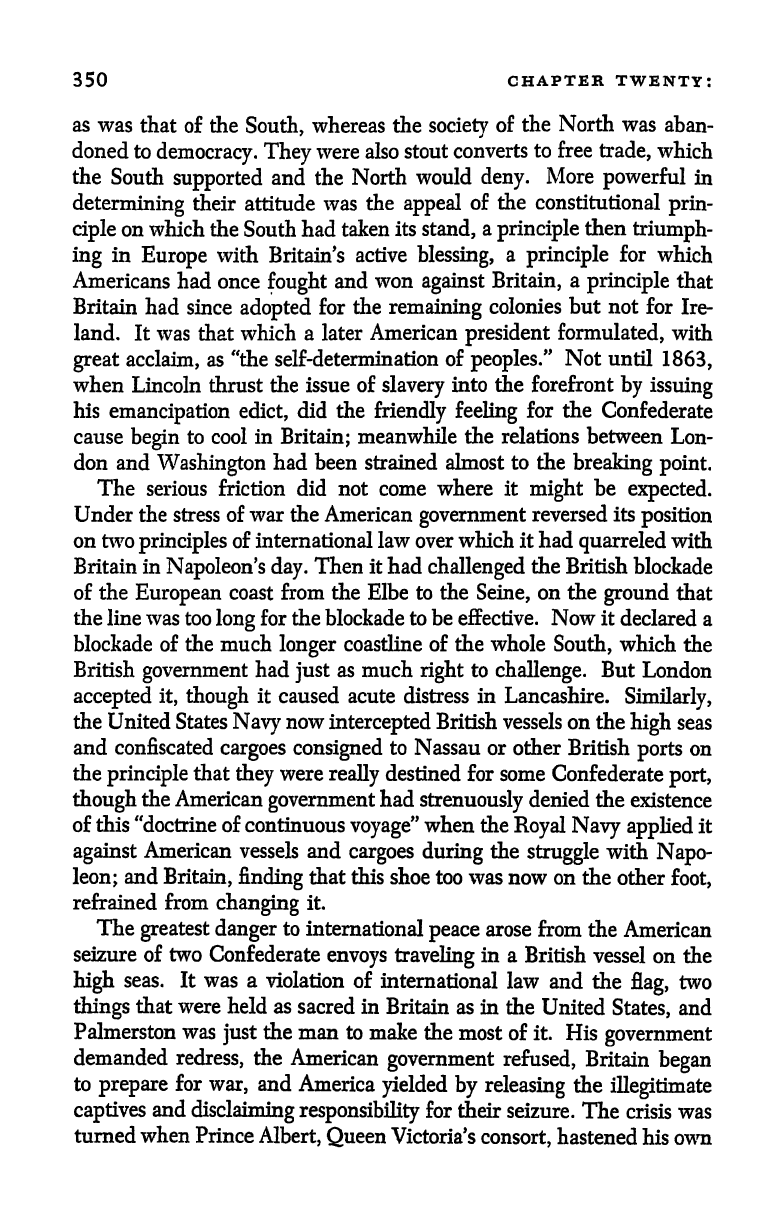
350
CHAPTER
TWENTY:
as
was
that
of
the
South,
whereas
the
society
of
the
North
was
aban-
doned to
democracy. They
were
also
stout
converts
to free
trade,
which
the
South
supported
and the
North
would
deny.
More
powerful
in
determining
their
attitude
was
the
appeal
of
the
constitutional
prin-
ciple
on which the
South
had taken
its
stand,
a
principle
then
triumph-
ing
in
Europe
with Britain's
active
blessing,
a
principle
for
which
Americans had once
fought
and
won
against
Britain,
a
principle
that
Britain
had since
adopted
for
the
remaining
colonies
but
not for
Ire-
land. It was
that
which
a
later
American
president
formulated,
with
great
acclaim,
as
"the self-determination
of
peoples."
Not
until
1863,
when
Lincoln
thrust the issue
of
slavery
into the forefront
by
issuing
his
emancipation
edict,
did
the
friendly
feeling
for
the
Confederate
cause
begin
to cool in
Britain;
meanwhile
the relations
between
Lon-
don
and
Washington
had been strained
almost to the
breaking point.
The
serious friction did not come
where
it
might
be
expected.
Under
the stress of
war
the American
government
reversed
its
position
on two
principles
of international
law
over
which it had
quarreled
with
Britain in
Napoleon's day.
Then it had
challenged
the
British
blockade
of
the
European
coast
from the
Elbe
to the
Seine,
on the
ground
that
the line was
too
long
for
the
blockade
to be effective. Now it
declared a
blockade
of
the much
longer
coastline
of
the
whole
South,
which
the
British
government
had
just
as much
right
to
challenge.
But
London
accepted
it,
though
it
caused acute
distress
in
Lancashire.
Similarly,
the United States
Navy
now
intercepted
British vessels
on the
high
seas
and confiscated
cargoes
consigned
to Nassau
or other British
ports
on
the
principle
that
they
were
really
destined for some
Confederate
port,
though
the American
government
had
strenuously
denied the
existence
of this "doctrine of
continuous
voyage"
when the
Royal
Navy
applied
it
against
American
vessels and
cargoes
during
the
struggle
with
Napo-
leon;
and
Britain,
finding
that
this
shoe too was
now
on
the other
foot,
refrained from
changing
it.
The
greatest danger
to
international
peace
arose
from the
American
seizure
of
two
Confederate
envoys
traveling
in
a
British
vessel
on the
high
seas. It was
a
violation of
international law
and the
flag,
two
things
that
were held as
sacred
in
Britain
as in the
United
States,
and
Palmerston
was
just
the man
to make
the
most of it.
His
government
demanded
redress,
the
American
government
refused,
Britain
began
to
prepare
for
war,
and
America
yielded
by
releasing
the
illegitimate
captives
and
disclaiming
responsibility
for
their
seizure.
The
crisis
was
turned when Prince
Albert,
Queen
Victoria's
consort,
hastened his own
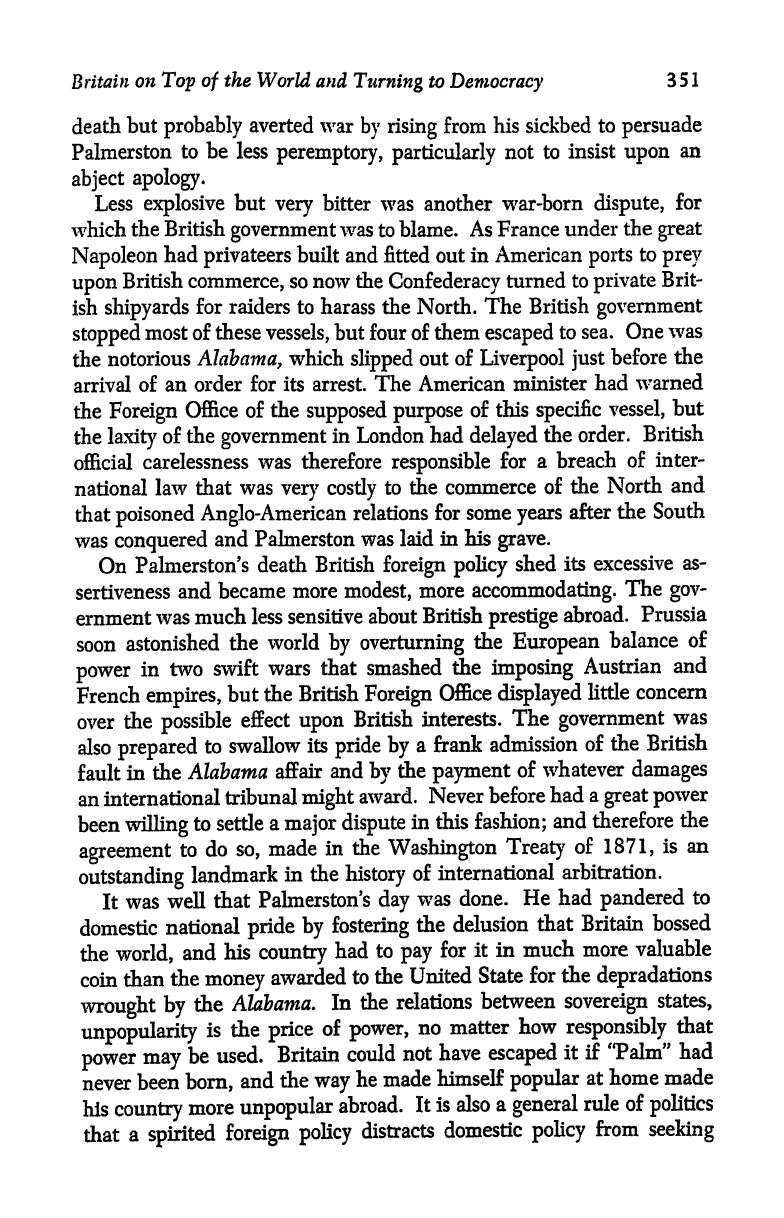
Britain
on
Top
of
the
World
and
Turning
to
Democracy
351
death
but
probably
averted war
by
rising
from
his
sickbed
to
persuade
Palmerston
to
be
less
peremptory, particularly
not to
insist
upon
an
abject
apology.
Less
explosive
but
very
bitter
was another
war-born
dispute,
for
which
the British
government
was
to
blame.
As
France
under
the
great
Napoleon
had
privateers
built
and fitted out
in
American
ports
to
prey
upon
British
commerce,
so now the
Confederacy
turned
to
private
Brit-
ish
shipyards
for
raiders
to harass the North.
The
British
government
stopped
most of
these
vessels,
but
four of
them
escaped
to
sea. One
was
the
notorious
Alabama,
which
slipped
out of
Liverpool
just
before
the
arrival
of an order for its arrest.
The American
minister
had
warned
the
Foreign
Office of the
supposed purpose
of
this
specific
vessel,
but
the
laxity
of
the
government
in London
had
delayed
the
order.
British
official
carelessness
was therefore
responsible
for
a
breach
of
inter-
national
law
that
was
very
costly
to the commerce
of
the
North
and
that
poisoned
Anglo-American
relations for
some
years
after
the South
was
conquered
and
Palmerston
was laid
in
his
grave.
On
Palmerston's
death
British
foreign
policy
shed
its
excessive
as-
sertiveness
and became
more
modest,
more
accommodating.
The
gov-
ernment
was much
less sensitive
about
British
prestige
abroad.
Prussia
soon
astonished
the
world
by
overturning
the
European
balance
of
power
in
two
swift
wars
that smashed
the
imposing
Austrian
and
French
empires,
but
the
British
Foreign
Office
displayed
little
concern
over
the
possible
effect
upon
British
interests.
The
government
was
also
prepared
to
swallow
its
pride
by
a frank
admission
of
the British
fault
in
the
Alabama
affair
and
by
the
payment
of
whatever
damages
an
international
tribunal
might
award.
Never before
had
a
great
power
been
willing
to
settle
a
major
dispute
in this
fashion;
and
therefore
the
agreement
to
do
so,
made
in
the
Washington
Treaty
of
1871,
is
an
outstanding
landmark
in the
history
of
international
arbitration.
It
was
well
that
Palmerston's
day
was
done.
He
had
pandered
to
domestic
national
pride
by
fostering
the delusion
that
Britain bossed
the
world,
and
his
country
had
to
pay
for
it
in
much
more valuable
coin
than
the
money
awarded
to
the
United
State
for
the
depradations
wrought
by
the
Alabama.
In
the
relations
between
sovereign
states,
unpopularity
is the
price
of
power,
no
matter
how
responsibly
that
power
may
be
used.
Britain
could
not
have
escaped
it
if "Palm"
had
never
been
born,
and
the
way
he
made
himself
popular
at home
made
his
country
more
unpopular
abroad.
It
is
also
a
general
rule of
politics
that
a
spirited
foreign
policy
distracts
domestic
policy
from
seeking
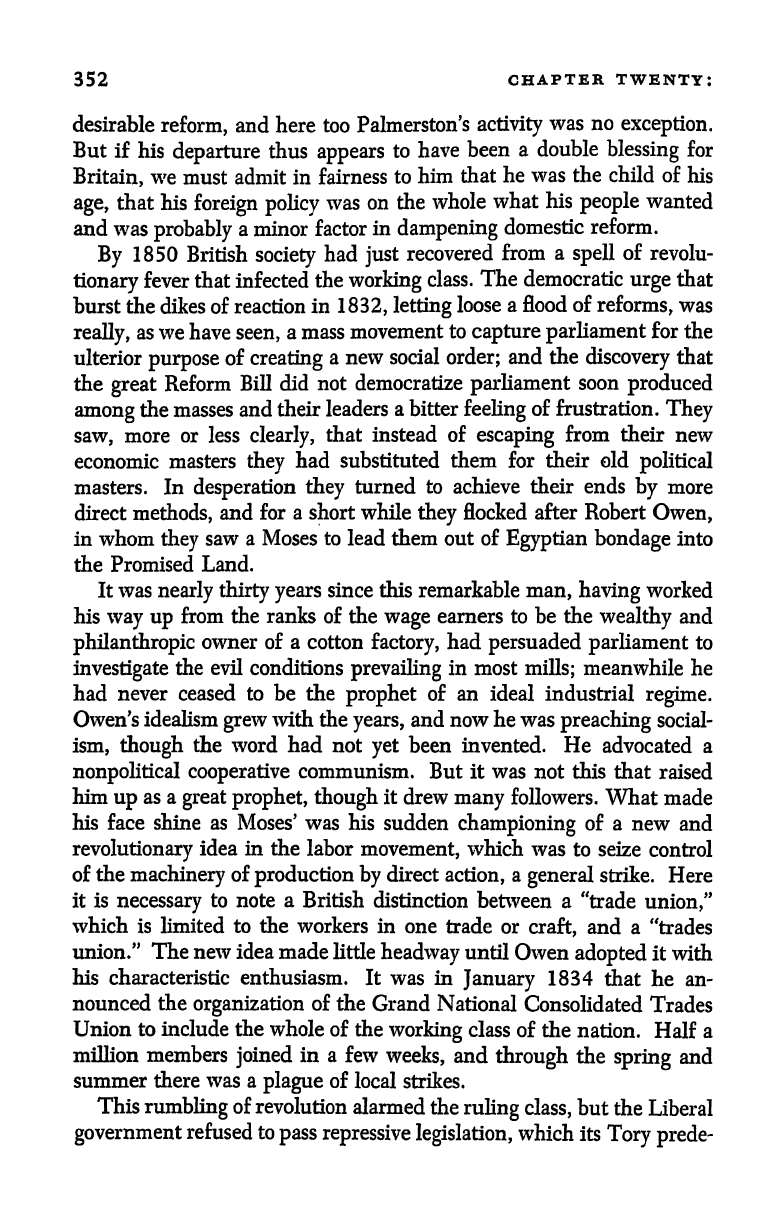
352
CHAPTER
TWENTY:
desirable
reform,
and here too
Palmerston's
activity
was
no
exception.
But
if
his
departure
thus
appears
to
have
been
a double
blessing
for
Britain,
we
must
admit in fairness
to
him
that
he
was the
child of
his
age,
that
his
foreign
policy
was
on
the
whole
what
his
people
wanted
and
was
probably
a minor
factor
in
dampening
domestic
reform.
By
1850 British
society
had
just
recovered
from
a
spell
of
revolu-
tionary
fever that infected
the
working
class.
The
democratic
urge
that
burst the
dikes of
reaction
in
1832,
letting
loose
a flood of
reforms,
was
really,
as we have
seen,
a
mass
movement
to
capture
parliament
for the
ulterior
purpose
of
creating
a
new social
order;
and the
discovery
that
the
great
Reform
Bill did
not democratize
parliament
soon
produced
among
the masses
and
their leaders
a
bitter
feeling
of frustration.
They
saw,
more
or
less
clearly,
that instead of
escaping
from their
new
economic
masters
they
had substituted
them
for
their old
political
masters.
In
desperation
they
turned to achieve their
ends
by
more
direct
methods,
and
for
a
short while
they
flocked
after Robert
Owen,
in
whom
they
saw
a
Moses
to
lead them out
of
Egyptian
bondage
into
the Promised
Land.
It
was
nearly thirty years
since this remarkable
man,
having
worked
his
way
up
from the ranks of the
wage
earners to be
the
wealthy
and
philanthropic
owner
of
a
cotton
factory,
had
persuaded parliament
to
investigate
the evil
conditions
prevailing
in most
mills;
meanwhile he
had
never ceased to be the
prophet
of
an
ideal industrial
regime.
Owen's
idealism
grew
with the
years,
and
now he was
preaching
social-
ism,
though
the
word had not
yet
been invented. He
advocated
a
nonpolitical
cooperative
communism. But it was not this
that
raised
him
up
as a
great
prophet,
though
it
drew
many
followers.
What made
his face shine
as
Moses*
was his sudden
championing
of a
new
and
revolutionary
idea
in
the
labor
movement,
which was
to seize
control
of the
machinery
of
production
by
direct
action,
a
general
strike.
Here
it is
necessary
to
note a
British distinction
between
a
"trade
union,"
which is limited
to the
workers in one
trade
or
craft,
and a
"trades
union." The
new
idea made little
headway
until
Owen
adopted
it with
his characteristic enthusiasm.
It
was
in
January
1834
that he an-
nounced
the
organization
of the
Grand
National
Consolidated Trades
Union to include
the
whole of
the
working
class of
the
nation.
Half
a
million
members
joined
in a
few
weeks,
and
through
the
spring
and
summer
there was a
plague
of
local
strikes.
This
rumbling
of
revolution
alarmed
the
ruling
class,
but
the
Liberal
government
refused
to
pass
repressive
legislation,
which
its
Tory prede-
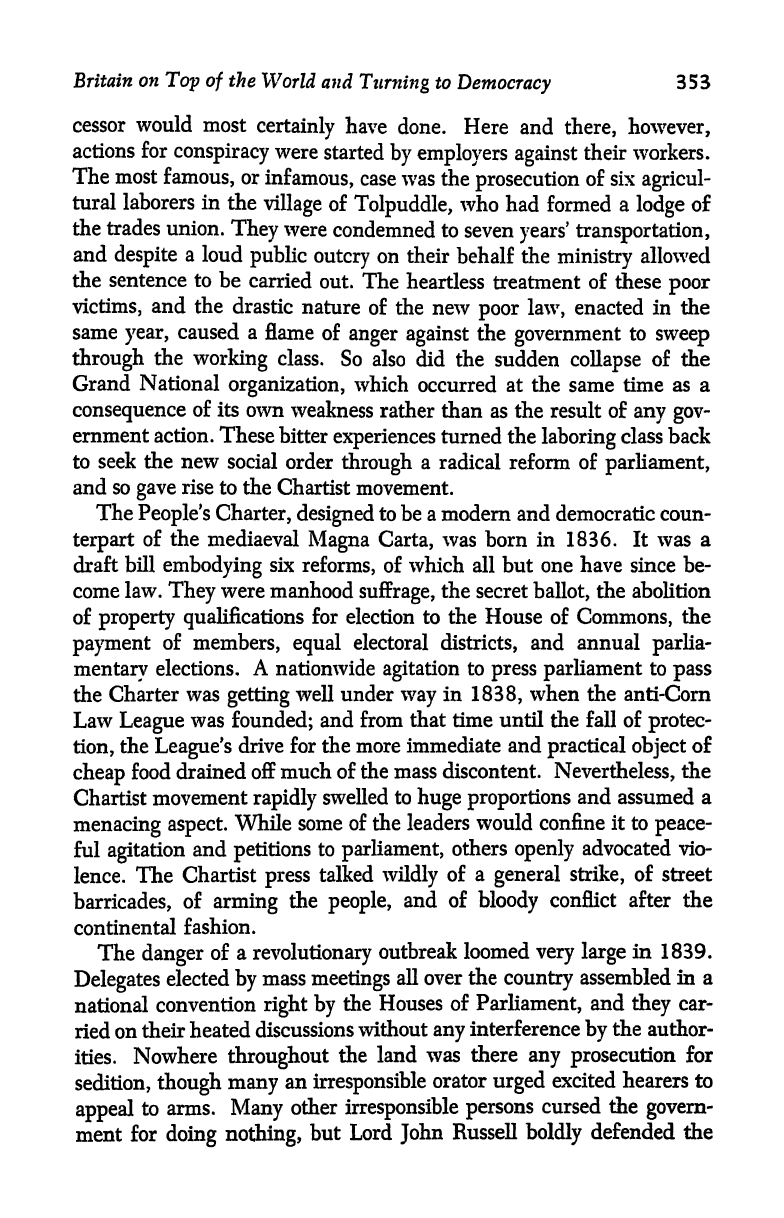
Britain
on
Top
of
the
World
and
Turning
to
Democracy
353
cessor
would
most
certainly
have
done. Here
and
there, however,
actions
for
conspiracy
were
started
by employers
against
their
workers.
The
most
famous,
or
infamous,
case was the
prosecution
of six
agricul-
tural laborers
in
the
village
of
Tolpuddle,
who
had formed
a
lodge
of
the
trades union.
They
were
condemned
to
seven
years'
transportation,
and
despite
a
loud
public
outcry
on their
behalf
the
ministry
allowed
the
sentence to
be
carried out.
The heartless
treatment
of
these
poor
victims,
and the
drastic
nature
of
the new
poor
law,
enacted in
the
same
year,
caused
a
flame
of
anger
against
the
government
to
sweep
through
the
working
class.
So
also
did the sudden
collapse
of
the
Grand
National
organization,
which
occurred
at
the same
time
as
a
consequence
of
its own
weakness rather than
as the
result
of
any gov-
ernment action.
These
bitter
experiences
turned
the
laboring
class back
to
seek
the new
social order
through
a
radical reform of
parliament,
and so
gave
rise
to
the Chartist
movement.
The
People's
Charter,
designed
to
be a modern and democratic coun-
terpart
of
the
mediaeval
Magna
Carta,
was born
in
1836.
It was
a
draft
bill
embodying
six
reforms,
of
which
all
but one
have
since be-
come
law.
They
were
manhood
suffrage,
the secret
ballot,
the abolition
of
property
qualifications
for
election to
the House
of
Commons,
the
payment
of
members,
equal
electoral
districts,
and
annual
parlia-
mentary
elections.
A
nationwide
agitation
to
press
parliament
to
pass
the
Charter
was
getting
well
under
way
in
1838,
when the
anti-Corn
Law
League
was
founded;
and
from
that
time until
the
fall
of
protec-
tion,
the
League's
drive for the
more immediate
and
practical
object
of
cheap
food
drained off
much
of
the mass
discontent.
Nevertheless,
the
Chartist
movement
rapidly
swelled
to
huge
proportions
and
assumed
a
menacing
aspect.
While
some
of
the
leaders
would
confine
it to
peace-
ful
agitation
and
petitions
to
parliament,
others
openly
advocated
vio-
lence.
The Chartist
press
talked
wildly
of
a
general
strike,
of
street
barricades,
of
arming
the
people,
and
of
bloody
conflict after the
continental
fashion.
The
danger
of
a
revolutionary
outbreak loomed
very large
in
1839.
Delegates
elected
by
mass
meetings
all
over
the
country
assembled in
a
national
convention
right
by
the Houses
of
Parliament,
and
they
car-
ried on
their
heated
discussions
without
any
interference
by
the
author-
ities.
Nowhere
throughout
the
land
was there
any
prosecution
for
sedition,
though
many
an
irresponsible
orator
urged
excited hearers
to
appeal
to
arms.
Many
other
irresponsible
persons
cursed the
govern-
ment
for
doing
nothing,
but
Lord
John
Russell
boldly
defended the
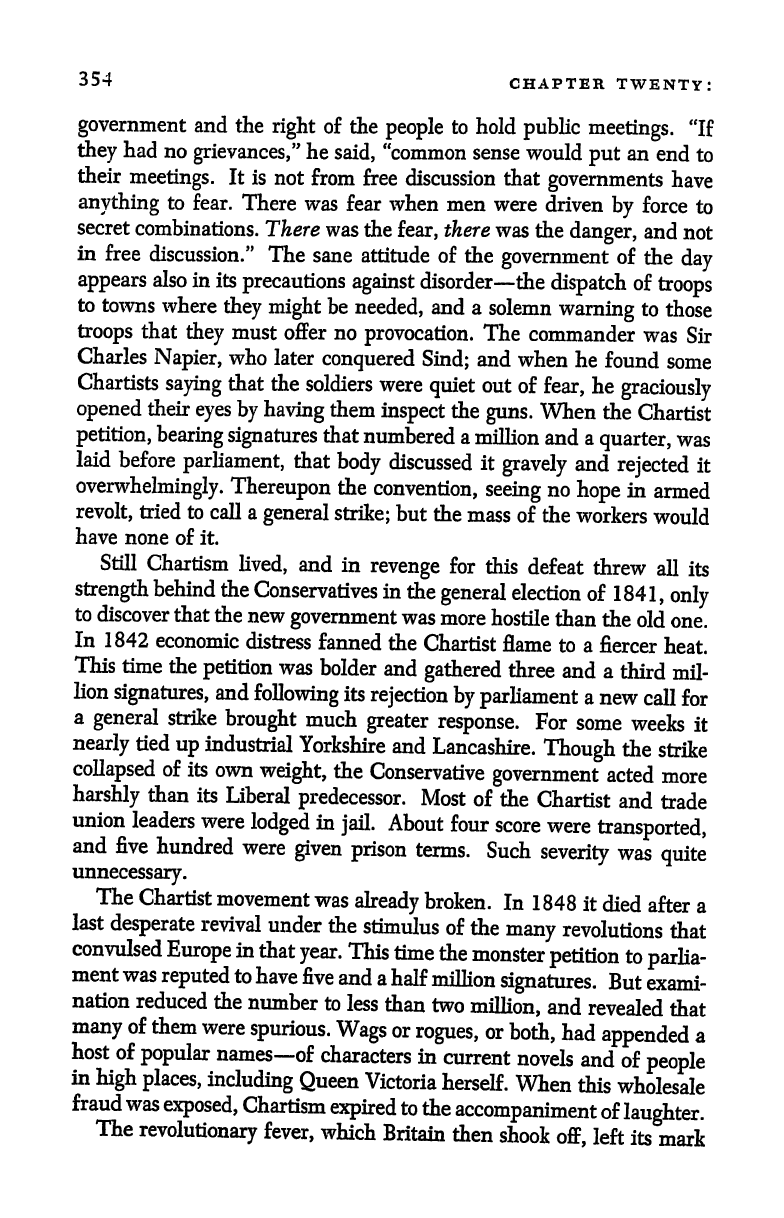
354
CHAPTER
TWENTY:
government
and
the
right
of the
people
to hold
public
meetings.
"If
they
had
no
grievances,"
he
said,
"common sense
would
put
an
end
to
their
meetings.
It
is
not
from
free discussion that
governments
have
anything
to
fear.
There
was fear when
men
were
driven
by
force
to
secret
combinations. There
was the
fear,
there
was the
danger,
and
not
in
free
discussion."
The
sane
attitude of
the
government
of
the
day
appears
also in
its
precautions
against
disorder
the
dispatch
of
troops
to
towns
where
they
might
be
needed,
and
a
solemn
warning
to
those
troops
that
they
must
offer
no
provocation.
The
commander
was
Sir
Charles
Napier,
who later
conquered
Sind;
and
when
he
found
some
Chartists
saying
that
the
soldiers
were
quiet
out
of
fear,
he
graciously
opened
their
eyes
by
having
them
inspect
the
guns.
When
the
Chartist
petition,
bearing
signatures
that
numbered a
million
and
a
quarter,
was
laid
before
parliament,
that
body
discussed it
gravely
and
rejected
it
overwhelmingly.
Thereupon
the
convention,
seeing
no
hope
in
armed
revolt,
tried to
call a
general
strike;
but
the
mass
of the
workers
would
have
none
of it.
Still
Chartism
lived,
and in
revenge
for
this
defeat
threw
all
its
strength
behind
the
Conservatives
in
the
general
election
of
1841,
only
to
discover
that
the new
government
was
more
hostile
than
the
old
one.
In 1842
economic
distress
fanned
the
Chartist
flame
to
a
fiercer
heat.
This
time
the
petition
was
bolder
and
gathered
three
and
a
third
mil-
lion
signatures,
and
following
its
rejection
by
parliament
a
new
call
for
a
general
strike
brought
much
greater
response.
For
some
weeks
it
nearly
tied
up
industrial
Yorkshire
and
Lancashire.
Though
the
strike
collapsed
of
its
own
weight,
the
Conservative
government
acted
more
harshly
than
its
Liberal
predecessor.
Most
of
the
Chartist
and
trade
union
leaders
were
lodged
in
jail.
About
four
score
were
transported,
and
five
hundred
were
given
prison
terms.
Such
severity
was
quite
unnecessary.
The
Chartist
movement
was
already
broken.
In
1848
it
died
after
a
last
desperate
revival
under
the
stimulus
of
the
many
revolutions
that
convulsed
Europe
in
that
year.
This
time
the
monster
petition
to
parlia-
ment
was
reputed
to
have
five
and
a
half
million
signatures.
But
exami-
nation
reduced
the
number
to
less
than
two
million,
and
revealed
that
many
of
them
were
spurious.
Wags
or
rogues,
or
both,
had
appended
a
host
of
popular
names
of
characters
in
current
novels
and
of
people
in
high
places,
including
Queen
Victoria
herself.
When
this
wholesale
fraud
was
exposed,
Chartism
expired
to
the
accompaniment
of
laughter.
The
revolutionary
fever,
which
Britain
then
shook
off,
left
its
mark
